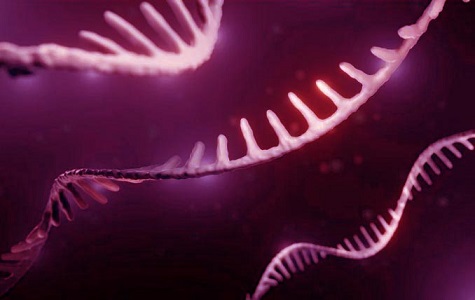The key role of long noncoding RNAs in gastrointestinal tumors and other cancers
Nikhil Prasad Fact checked by:Thailand Medical News Team Aug 13, 2024 1 year, 4 months, 2 weeks, 14 hours ago
Medical News: Unraveling the Mystery of lncRNAs
Long noncoding RNAs (lncRNAs) are a fascinating group of RNA molecules that don't code for proteins but play crucial roles in regulating various cellular processes. This
Medical News report will explore their involvement in gastrointestinal tumors, focusing on how they interact with the PI3K/AKT pathway, a critical mechanism for cell growth and survival.
 The key role of long noncoding RNAs in gastrointestinal tumors and other cancers
The Vital Link: lncRNAs and the PI3K/AKT Pathway
The key role of long noncoding RNAs in gastrointestinal tumors and other cancers
The Vital Link: lncRNAs and the PI3K/AKT Pathway
lncRNAs have been found to significantly influence the PI3K/AKT pathway, which helps control cell growth, proliferation, and survival. When this pathway is dysregulated, it can lead to cancer. This article highlights the intricate interactions between lncRNAs and the PI3K/AKT pathway, particularly in gastrointestinal tumors like gastric cancer (GC), liver cancer (LC), colorectal cancer (CRC), pancreatic cancer (PC), and esophageal cancer (EC).
Gastric Cancer: The Impact of lncRNAs
In gastric cancer, several lncRNAs are found to be overexpressed, meaning their levels are higher than normal. For instance, the lncRNA AK023391 is linked to poor survival rates and increased tumor growth. This lncRNA interacts with the PI3K/AKT pathway, enhancing cancer cell proliferation and invasion.
Another lncRNA, THAP7-AS1, is associated with lymph node metastasis in GC. It activates the PI3K/AKT pathway by binding to other molecules, promoting cancer cell growth and spread. Similarly, LINC00152, highly expressed in GC tissues, interacts with the EGFR protein, leading to increased tumor cell proliferation via the PI3K/AKT pathway.
Liver Cancer: lncRNAs Driving Tumor Progression
In liver cancer, lncRNAs like HULC and PTTG3P play critical roles. HULC promotes cancer cell growth by enhancing autophagy, a process where cells break down and recycle components. It achieves this by interacting with the PI3K/AKT pathway, further driving tumor growth.
PTTG3P is another lncRNA found in higher levels in liver cancer tissues. It activates the PI3K/AKT pathway, leading to increased tumor growth, cell cycle progression, and metastasis. These interactions underscore the potential of targeting lncRNAs in liver cancer treatment.
Colorectal Cancer: Complex Interactions with lncRNAs
Colorectal cancer (CRC) also exhibits significant interactions between lncRNAs and the PI3K/AKT pathway. LINC01296, for example, is upregulated in CRC tissues and linked to advanced tumor stages and poor prognosis. It interacts with the PI3K/AKT pathway, promoting tumor growth and metastasis.
Similarly, HOTAIR, another lncRNA, sponges miR-326, leading to increased fucosylation of CD44, a protein involved in cell adhesion. This modification enhances the PI3K/AKT pathway, promoting cancer cell proliferation and invasion.
Pancreatic Cancer: lncRNAs Fueling Aggression<
;br />
In pancreatic cancer, lncRNAs such as LINC01268 and HOXA10-AS are overexpressed. LINC01268 interacts with the PI3K/AKT pathway by sponging miR-217, leading to increased tumor cell proliferation and invasion. HOXA10-AS, on the other hand, sponges miR-340-3p, enhancing the expression of HTR1D and activating the PI3K/AKT pathway, which drives tumor growth.
Esophageal Cancer: Emerging Role of lncRNAs
Esophageal cancer (EC) also involves lncRNAs that interact with the PI3K/AKT pathway. Whole-genome and RNA sequencing analyses have identified significant mutations in several lncRNAs, suggesting their crucial role in EC development. These interactions need further exploration to develop precise treatments and preventive measures for EC.
Conclusion: The Future of lncRNA Research in Cancer Treatment
The intricate relationship between lncRNAs and the PI3K/AKT pathway highlights the potential for new cancer therapies. By targeting these interactions, researchers can develop more effective treatments for gastrointestinal tumors.
Understanding these mechanisms also offers insights into better diagnostic and prognostic tools, ultimately improving patient outcomes.
The study findings were published in the peer-reviewed journal: Frontiers in Cell and Developmental Biology.
https://www.frontiersin.org/journals/cell-and-developmental-biology/articles/10.3389/fcell.2024.1442193/full
For the latest on Long noncoding RNAs (lncRNAs), keep on logging to Thailand
Medical News.
Read Also:
https://www.thailandmedical.news/news/spanish-study-finds-that-sars-cov-2-alters-landscape-of-host-small-non-coding-rnas
https://www.thailandmedical.news/news/breaking-covid-19-news-australian-scientists-discover-a-microrna-called-cov2-mir-o8-that-is-encoded-by-sars-cov-2-and-is-possibly-pathogenetic
